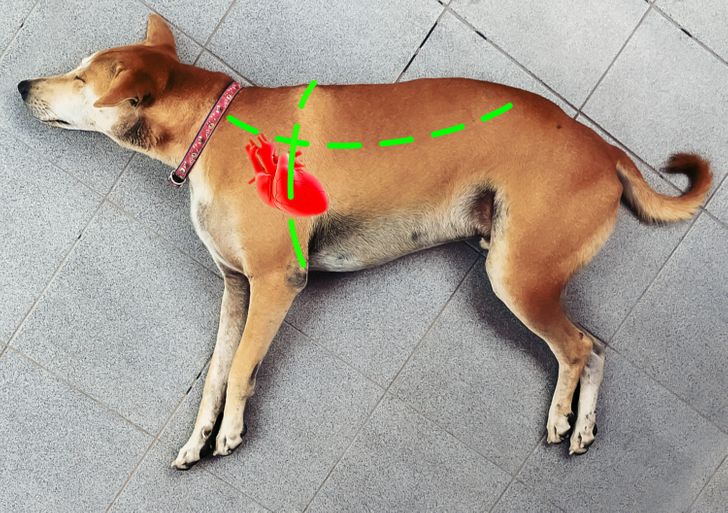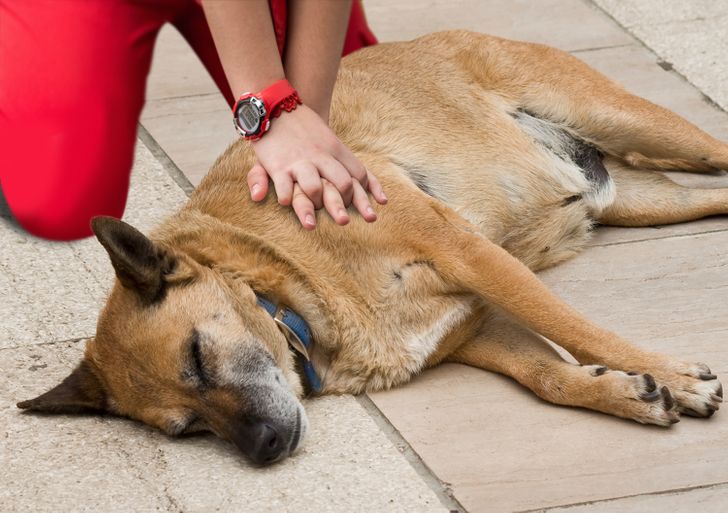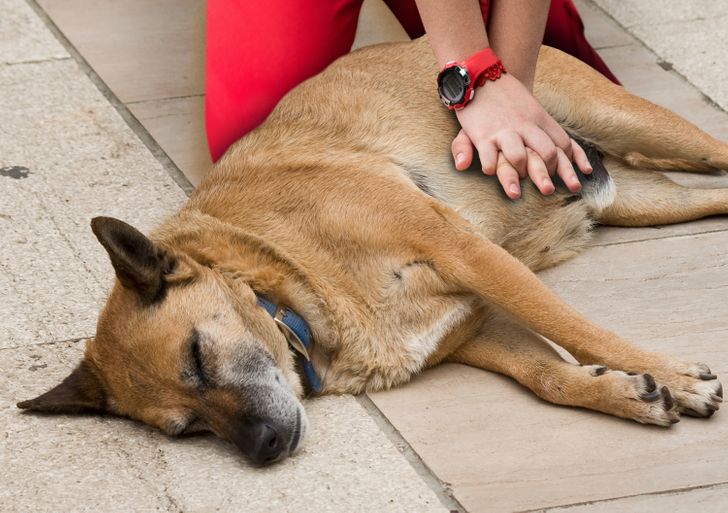very useful information, need to save it
How to Rescue a Dog in 6 Steps
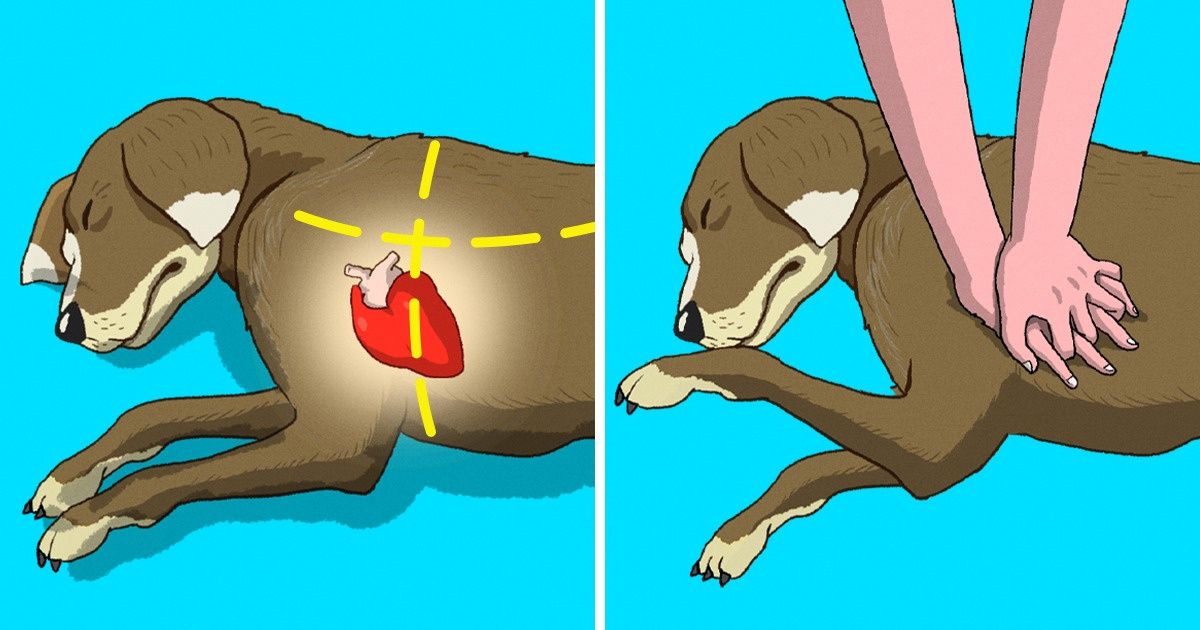
Unexpected health issues can appear in a dog of any age, breed, and state of health. If their heart suddenly stops or they can’t breathe, rushing to a vet won’t be an option. That’s why it’s important to keep in mind a simple and effective first aid technique that will help you to bring your 4-legged friend back to life.
Bright Side is ready to help all the dog owners out there, and wants you to learn 2 basic procedures — compressions and artificial respiration — to always be ready for anything.
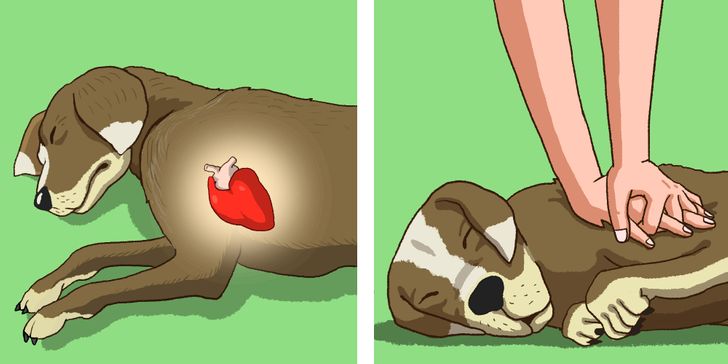
- Checking your dog’s breathing: Put your hand in front of their nose and try to feel the air. Also, check to see if their chest rises and falls. If a dog is not breathing, then check their mouth for an obstruction and pull their tongue forward.
- Checking your dog’s pulse: Hold the large pad of their paw to feel their pulse, or check it inside of the hind leg at the place where leg joins the body.
- If your dog has a pulse, but isn’t breathing then you will need to perform artificial respiration. If it has no pulse, you will need to perform cardiopulmonary resuscitation (CPR).
Warning: You should not practice CPR on a healthy dog. This can cause serious health issues, especially if the procedure is not performed right.
Step 1: Position your dog properly
- First, put your dog on their right side on a flat hard surface.
- Your dog’s head should be positioned straight, and their neck extended. This positioning is supposed to open a direct passage for their airway.
- In the dog’s mouth, pull their tongue forward to make it lie on the back of the dog’s teeth and then close their jaw. Get behind the dog.
Step 2: Find the position of their heart
- For bigger dogs: The procedure is performed on the widest part of the dog’s ribcage, near their heart, but not directly on it.
- For smaller dogs (30lbs (16.6kg) or less): you can position your fingers on one side of their chest and your thumb on the other, around it, or just use your fingers on top.
Step 3: Performing compressions
- Place your palms one on top of the other, with your elbows straight and start pushing down on your dog’s rib cage. The pushes should be firm and quick, one after another.
- You only need to compress 1/4 to 1/3 of their chest width.
- Repeat these movements 15 times for approximately 10 seconds.
- For smaller dogs: Using the whole palm for these dogs will be too much. In this case, just use your thumbs or fingers to press the chest area. Also, you need to perform more compressions — about 17 over a period of 10 seconds.
Step 4: Artificial respiration
Perform artificial respiration after every 15 compressions.
- First, you need to seal the dog’s lips by placing your hand over their muzzle. The dog’s mouth should be closed.
- With your mouth, move to the dog’s nostrils and blow in gently. As you do this, dog’s chest will get bigger and rise. If this doesn’t happen, then try to blow harder and check to see if the dog’s mouth is fully closed.
- Between these “breaths” remove your mouth from the nose and your hand from the muzzle to let air flow and return.
Step 5: Perform an abdominal squeeze
Bigger dog breeds can also benefit from an abdominal squeeze procedure.
- Move to your dog’s abdominal area. Place your palms, one on top of the other.
- Now you need to push down and squeeze the dog’s belly. This will help blood flow to the heart.
- Repeat this way: 15 compressions, one artificial respiration, and then one abdominal squeeze.
Step 6: Repeat
Keep repeating the steps until the dog regains a steady pulse and starts to breathe. Do it for no longer than 20 minutes.
Of course, it’s very important to visit a vet right afterward to get your friend checked out. Have you ever seen someone save a pet’s life? Let’s share our stories in the comment section!
Comments
Nice tips but I hope I won't need to use them
Very useful. Thank you for this article
Related Reads
My Cousin Uninvited Me to Save Money—My Petty Revenge Was Absolutely Worth It

I Refused to Expose My Salary to My Parents, Now My Life Is Falling Apart

I Refused to Let My Boyfriend Discipline My Child—He’s Not His Real Dad

I Refuse to Let a Strange Lady Touch My Rare Birthmark for "Good Luck"—Now I’m Being Threatened

16 Moments That Show Kindness Is the Strength the World Needs

My Mom Forgot About Me Until She Needed My Help—I Turned the Tables on Her

10 Hospital Workers Who Prove Kind Heart Is a Powerful Medicine

16 Families Whose Everyday Life Is Basically a Sitcom

I Refuse to Be My Mom’s Retirement Plan After She Chose to Stay Home Her Whole Life

My Parents Wanted a ‘Family Vacation’ on My Budget—I Made One Move They Didn’t Expect

15 Stories That Show Kindness Is a Quiet Language the World Needs

I Refuse to Give My Retirement Savings to My Adult Son—I’m Not Responsible for His Failures


